自动化专业英语课程介绍
自动化专业英语第三版课程设计

自动化专业英语第三版课程设计一、课程介绍自动化专业英语是用于培养自动化工程技术人员英语语言技能的专业英语教材。
本课程加强与工程实践的链接,旨在提高学生在从事自动化工程以及国际交流中的英语交流能力,以及跨学科的能力和跨文化的意识。
二、课程目标1.掌握英语专业语言,能够在自动化工程实践中进行专业交流;2.学习跨文化交流技巧,能够适应国际化工作环境;3.培养自主学习能力,能够应对本专业以及国际领域的新知识和新技术。
三、教学内容1.自动化专业英语语言知识的学习,包括英语语法、词汇、语音、听力、口语和阅读;2.自动化技术的专业知识,包括控制原理、自动控制技术、自动化测试技术等;3.跨文化交际技能,包括英语交际技能、跨文化沟通技能、国际商务礼仪等。
四、教学方法1.采用任务型教学方法,将学生置于具有实际意义和应用价值的交际情境中,在任务中体验与学习;2.采用多媒体教学手段,帮助学生提高听力、阅读、写作和口语能力;3.采用小组合作学习,提高学生自学、协作和交流能力。
五、课程评估1.平时成绩:包括英语学习情况、任务完成情况、小组合作学习情况等,占60%;2.期末考试:考察学生英语语言知识和自动化专业知识,占40%;3.开展英语技能竞赛:鼓励学生积极参与各类英语技能比赛,提高语言水平。
六、参考教材1.《自动化专业英语》第三版朱洁莉等编西安石油大学出版社;2.《自动化控制原理》第四版邵幸民等编机械工业出版社;3.《自动化测试技术》第二版高世红编冶金工业出版社。
七、教学进度安排章节教学内容教学时间第一章英语语言知识2周章节教学内容教学时间第二章自动化技术简介1周第三章控制原理2周第四章自动控制技术2周第五章自动化测试技术2周第六章跨文化交流技能2周第七章国际商务礼仪1周第八章综合实验3周八、总结本课程旨在提高自动化专业学生的英语语言能力和自主学习能力,将学生引入到实际的工程项目中,培养学生的跨学科、跨文化、应变能力。
我们相信,通过学习和实践,学生将获得宝贵的知识和技能,为未来的职业生涯打下坚实的基础。
电气工程及其自动化专业英语介绍
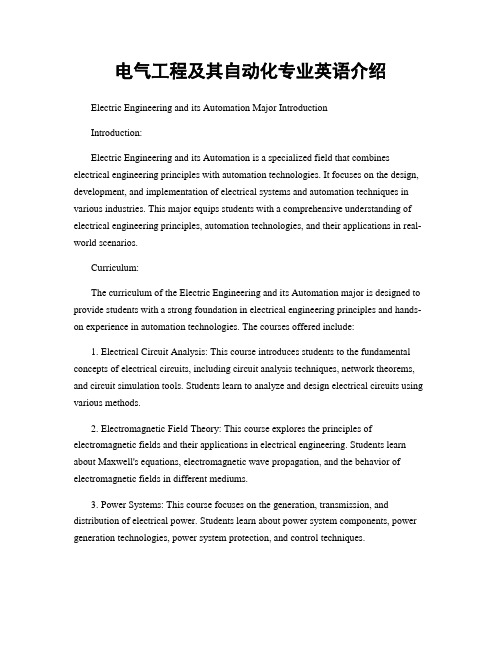
电气工程及其自动化专业英语介绍Electric Engineering and its Automation Major IntroductionIntroduction:Electric Engineering and its Automation is a specialized field that combines electrical engineering principles with automation technologies. It focuses on the design, development, and implementation of electrical systems and automation techniques in various industries. This major equips students with a comprehensive understanding of electrical engineering principles, automation technologies, and their applications in real-world scenarios.Curriculum:The curriculum of the Electric Engineering and its Automation major is designed to provide students with a strong foundation in electrical engineering principles and hands-on experience in automation technologies. The courses offered include:1. Electrical Circuit Analysis: This course introduces students to the fundamental concepts of electrical circuits, including circuit analysis techniques, network theorems, and circuit simulation tools. Students learn to analyze and design electrical circuits using various methods.2. Electromagnetic Field Theory: This course explores the principles of electromagnetic fields and their applications in electrical engineering. Students learn about Maxwell's equations, electromagnetic wave propagation, and the behavior of electromagnetic fields in different mediums.3. Power Systems: This course focuses on the generation, transmission, and distribution of electrical power. Students learn about power system components, power generation technologies, power system protection, and control techniques.4. Control Systems: This course introduces students to the principles of control systems and their applications in automation. Topics covered include system modeling, feedback control, stability analysis, and controller design techniques.5. Programmable Logic Controllers (PLCs): This course provides students with a practical understanding of PLCs and their applications in automation. Students learn about ladder logic programming, PLC hardware, and interfacing techniques.6. Industrial Automation: This course explores the various automation technologies used in industrial settings. Students learn about sensors and actuators, industrial communication protocols, and automation system integration.Career Prospects:Graduates with a major in Electric Engineering and its Automation have a wide range of career opportunities in various industries. Some potential career paths include:1. Electrical Engineer: Graduates can work as electrical engineers, designing and developing electrical systems for power generation, transmission, and distribution. They can also work on projects related to control systems and automation.2. Automation Engineer: Graduates can pursue careers as automation engineers, designing and implementing automation systems in manufacturing, process control, and robotics industries. They can work on projects involving PLCs, industrial robots, and SCADA systems.3. Power Systems Engineer: Graduates can specialize in power systems engineering, working on projects related to power generation, transmission, and distribution. They can design and optimize power grids, analyze power system stability, and develop renewable energy systems.4. Research and Development: Graduates can work in research and development roles, exploring new technologies and innovations in the field of electrical engineering and automation. They can contribute to advancements in power systems, control systems, and automation technologies.Conclusion:The Electric Engineering and its Automation major provides students with a strong foundation in electrical engineering principles and automation technologies. With a comprehensive curriculum and hands-on experience, graduates are well-prepared for careers in various industries. Whether it is designing electrical systems, implementing automation technologies, or working on power systems projects, graduates of this major have the skills and knowledge to excel in the field of electric engineering and its automation.。
自动化课程简介中英文

自动化课程简介中英文自动化课程简介自动化课程简介(Introduction to Automation Course)课程概述(Course Overview):自动化课程是一门介绍自动化技术和应用的基础课程。
该课程旨在帮助学生了解自动化的基本原理、技术和应用,并培养学生在自动化领域的基本能力。
通过本课程的学习,学生将了解自动化的发展历程、自动化系统的组成和工作原理,以及自动化在各个领域的应用。
课程目标(Course Objectives):1. 了解自动化的基本概念和原理;2. 掌握自动化系统的组成和工作原理;3. 熟悉自动化技术在工业、交通、医疗等领域的应用;4. 培养学生在自动化领域的基本技能和实践能力。
课程大纲(Course Syllabus):1. 自动化概述- 自动化的定义和发展历程- 自动化与人工操作的比较- 自动化技术的分类和应用领域2. 自动化系统- 自动化系统的组成和层次结构- 传感器和执行器的原理和应用- 控制器和执行器的选择和配置3. 控制理论基础- 反馈控制原理- 控制系统的稳定性和性能指标- PID控制器的原理和调节方法4. 自动化技术应用- 工业自动化技术- 交通自动化技术- 医疗自动化技术- 农业自动化技术5. 自动化实验- 自动化系统的建模和仿真- 控制器的设计和调试- 自动化系统的性能评估和优化教学方法(Teaching Methods):1. 授课:教师通过讲解理论知识和实际案例,介绍自动化的基本概念和原理。
2. 实验:学生将参与自动化实验,通过实际操作来巩固所学知识,并培养实践能力。
3. 讨论:教师组织学生进行小组讨论,促进学生之间的交流和合作。
评估方式(Assessment Methods):1. 课堂表现:包括课堂参与度、作业完成情况等。
2. 实验报告:学生需撰写实验报告,对实验过程和结果进行分析和总结。
3. 期末考试:考察学生对课程内容的理解和掌握程度。
自动化专业英语P1U4教学课件

Reverse Leakage current
Forward Leakage current
+VA
Forward Breakover
voltage
Avalanche breakdown
-IA
图 1-4A-2 晶闸管符号和伏安特性
P1U4A Power Semiconductor Devices
第一部分第四单元课文A
自动化专业英语教程
教学课件
P1U4A Power Semiconductor Devices
第一部分第四单元课文A
功率半导体器件
A 功率半导体器件
1. 课文内容简介:主要介绍专业课《电力电子技术》中大功 率二极管、晶闸管、双向可控硅、门极可关断晶闸管、电 力金属氧化物半导体(MOS)场效应晶体管、绝缘栅双 极型晶体管、金属氧化物半导体控制的晶闸管、集成门极 换向晶闸管的电路符号、伏安控制特性、特点和适用场合 等内容。
门极可关断晶闸管,顾名思义,是一种晶闸管类型的器件。 同其他晶闸管一样,它可以由一个小的正门极电流脉冲触 发,但除此之外,它还能被负门极电流脉冲关断。
[3] Such a gate current pulse of very short duration and very large di/dt has small energy content and can be supplied by multiple MOSFETs in parallel with ultra-low leakage inductance in the drive circuit.
P1U4A Power Semiconductor Devices
第一部分第四单元课文A
自动化课程英文描述
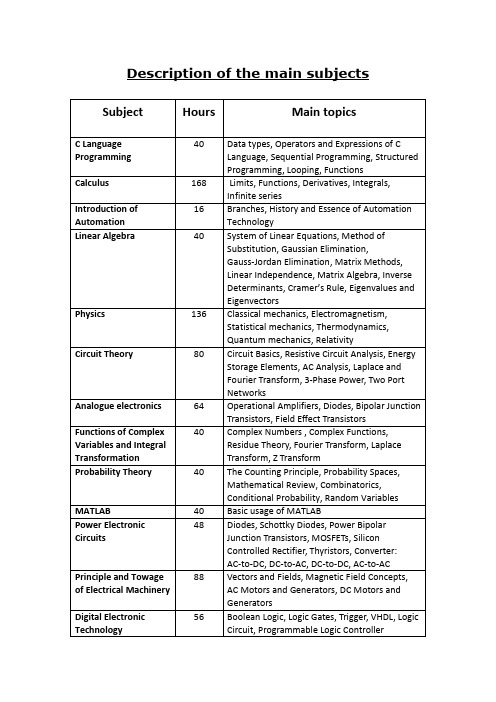
Single-Loop DCMotorControl System, Multi-Loop DCMotorControl System, Reversible DC Motor control System
Robotics
32
Introduction of Ron, Components
Computer Control System
64
Fourier Transform, Z Transform, Stability Analysis of Computer Control System, Analog Design Method of Digital Controller(PID Controller, Smith Predictive Control ), Direct Design Method of Digital Controller
Power Supplyof Industrial Enterprise
48
Calculation ofElectrical Load, Short-Circuit Current and its Calculation,Electrical Substation and Power Supply Network,Overload Protection
自动化课程英文描述课程描述英文自动化专业描述电气自动化课程电气自动化专业课程电气自动化主修课程自动化专业主修课程自动化专业课程电气自动化专业描述自动化专业主要课程
Description of themainsubjects
Subject
Hours
Main topics
C Language Programming
56
自动化课程英文描述

自动化课程英文描述Title: English Description of Automation CourseIntroduction:In recent years, automation has become an essential part of various industries, including manufacturing, healthcare, and finance. As the demand for automation professionals continues to grow, it is important to have a clear and concise English description of automation courses to attract students and professionals interested in this field.1. Course Overview1.1 The automation course provides students with a comprehensive understanding of automation technologies and their applications in various industries.1.2 Students will learn about the principles of automation, including sensors, actuators, control systems, and programming languages.1.3 The course will cover topics such as industrial automation, robotic systems, PLC programming, and SCADA systems.2. Learning Objectives2.1 Upon completion of the course, students will be able to design and implement automated systems for different industrial processes.2.2 Students will gain hands-on experience in programming PLCs, configuring robotic systems, and designing control systems.2.3 The course will equip students with the necessary skills to troubleshoot and maintain automated systems effectively.3. Course Structure3.1 The course consists of lectures, practical lab sessions, and projects to provide a well-rounded learning experience.3.2 Students will have the opportunity to work on real-world automation projects to apply their knowledge and skills.3.3 The course will also include guest lectures from industry experts to provide insights into the latest trends and technologies in the field of automation.4. Prerequisites4.1 Students enrolling in the automation course should have a basic understanding of electrical engineering and programming concepts.4.2 It is recommended for students to have prior knowledge of PLC programming, robotics, and control systems.4.3 Proficiency in English is essential for understanding the course materials and communicating effectively with instructors and peers.5. Career Opportunities5.1 Graduates of the automation course will have a wide range of career opportunities in industries such as manufacturing, automotive, aerospace, and healthcare.5.2 Job roles for automation professionals include automation engineer, control systems engineer, robotics specialist, and PLC programmer.5.3 With the increasing demand for automation experts, graduates can expect competitive salaries and opportunities for career advancement in the field of automation.Conclusion:In conclusion, the English description of the automation course provides a detailed overview of the course content, learning objectives, structure, prerequisites, and career opportunities for students and professionals interested in pursuing a career in automation.By enrolling in the automation course, students can acquire the necessary skills and knowledge to excel in the rapidly growing field of automation.。
自动化专业英语教程

Specified english for automation自动化专业英语教程Network 网络,电路resistor 电阻器Inductor 电感器capacitor 电感器Passive network 无缘电路active network 有缘网络Characteristic 特性特性曲线Ohm 欧姆Faraday 法拉第electriccharge 电荷Integral 积分incremental 增量Armature 电枢,衔铁,加固aforementioned 上述的,前面提到的Represent 代表,表示,阐明amplify 放大Symbolic 符号的,记号的mesh 网孔Kirchhoff's first law 基尔霍夫第一定律loop current 回路电流V oltage drop 电压降in series 串联Differential 微分的微分variable 变量Outline 轮廓,提出要求eliminate 消除,对消Pulsate 脉动,跳动,振动apparatus 一套仪器,装置Rated 额定的,设计的,适应的distribution 分配分布配电Generator 发生器发电机emf 电动势Interconnect 互相连接wye Y型连接星形连接,三通Delta 希腊字母三角形geometry 几何学几何形状Winding 缠绕的线圈绕组polarity 极性Neutral 中性的中性线subscript 下标角注索引Succeed 继-----之后接替intersection 相交逻辑乘法Phase sequence 相序reverse 反转变换极性的Amplifier 放大器integrated circuit 集成电路Building blocks 积木potential 电势Cascade 串联串联的on zhe order of 属于同类的,约为Trade off 换取cumbersome 发烦的Intrinsic 内在的circuitry 电路Transistor 晶体管semiconductor 半导体Dope 掺入predominance 优势Crystal 晶体germanium 锗Silicon 硅bipolar 双向的Lead 引线substitution 代替Detector 探测器bias 偏压Polarity 极性encompass 包含More or less 或多或少cylindrical 圆柱形的Can 密封外壳triangular 三角的Elongate 延长,拉长flip-flop 触发器Relevance 关联rerminology 术语Aptness 恰当的pilot 飞行员Aloft 高高地cockpit 座舱Deduce 演绎simultaneously 同时地Boolean algebra 布尔代数gate 门门电路Prevalent 流行的inhibit 抑制Binary 二进制的parallel 类似Decimal 十进制的radix 权Chain 串remainder 余数Digit 位数fractional 小数的Hexadecimal 十六进制的octal 八进制的Alignment 组合converter 转换器换流器变流器Matrix 模型矩阵diode 二极管半导体二极管Thyristor 晶闸管triac 三端双向晶闸管GTO 门极可关断晶闸管power MOSFET 电力MOS场效应晶体管SIT 静态感应晶体管IGBT 绝缘栅双极型晶体管MCT MOS控制晶闸管IGCT 集成门极换向晶闸管Rectification 整流feedback 反馈Freewheeling 单项传动snubber 缓冲器减震器Intrinsic 固有的体内的本征forward biased 正向偏置Conduction 导电传导reverse biased 反向偏置Leakage current 漏电流threshold 门限阀限极限Breakdown 击穿雪崩recovery 恢复Schottky diode 肖基特二极管workhorse 重载重负荷Rhyratron 闸流管breakover 导通Latching current 闭锁电流holding current 保持电流Phase controllde 相控的asymmetric 不对称的Symmetric 对称的force commutated 强制换向SMPS 开关电源BLDM 无刷直流电动机Stepper motor 步进电动机hybrid 混合Emitter 发射极saturation 饱和Rectifier 整流器chopper 斩波器Inverter 逆变器cycloconverter周波变换器Electrochemical 电化学的V AR 静态无功功率Harmonics 谐波lagging 滞后迟滞Power factor 功率因数configuration 轮廓格局V oltage-fed inverter 电压源型逆变current-fed inverter 电流型逆变器Stiff voltage source 恒压源stiff current source 恒流源Thevenin impedance 戴维南电路等效阻抗filter 滤波器Isolation transformer 隔离变压器boost chopper 升压式变压器Quadrant 象限duty ratio 占空比功率比Commercially 工业地商业地permanent-DC motor 串励直流电动机shunt-wound DC motor 并励直流电动机Counterpart 对应物配对物assembly 装置构件Stator 定子rotor 转子Alnico 铝镍钴合金ceramic 陶瓷的Horsepower 马力功率frame 机壳机座Demagnetization 机械功率flux 磁通Mechanical power 励磁绕组turn 匝数Rheostat 变阻器cumulative 累积的Differential 差得差别的scheme 方法形式示意图Proportional to 与----成正比的sensor 传感器Filter 滤波ripple 波纹波动Firing angle 触发角damping 阻尼阻尼的Steady-state 稳态prevent----from doing 使--不Threshold 阀override 超过压倒Converter 逆变器整流器accelerate 加速Saturation 饱和disturbance 扰动干扰Transient 暂态的瞬态的过渡的overshoot 超调量Deteriorate 恶化变坏sluggish 惰性的缓慢的Oscillatory 振荡的tolerant 容许的容忍的At the most 至多sinusoidal 正弦的Constant-speed 恒速的cariable-speed 变速的Induction machine 同步电机VRM 变磁阻电机Switched reluctance machine 开关磁阻电机rugged 结实的耐用的Fractional 分数的concentrated 集中绕组Distributed 分散的分布的slot 槽Wound-rotor 绕线转子cage 笼子笼形Core 铁芯laminated 分成的叠片的Ferromagnetic铁磁性的铁磁体的air gap 气隙Salient 凸起的突出的synchronous speed 同步转速Leading 超前的hydro-electric 水力发电的Nonsalient 非凸起的隐藏的amortisseur 阻尼器Damper winding 阻尼绕组encoder 编码器Slip 转差(率)mechanism 机理作用原理Square-wave 方波pulse-width modulation 脉宽调制Force-commutation 强制换向with respect to 相对于Fictitious 假想的line to line voltage 线电压Lagging 滞后clamp 定位Airgap 气隙leakage 漏Horsepower 功率field-weakening 弱磁Supersede 取代isosceles 等腰的Carrier 载波载体even 偶数的Notch 换相点换极点rms 有效值方均根Look-up table 限制(在---范围内)distortion 失真Transformer 变压器substation 变电站Prime mover 原动机turbine 涡轮Aluminum 铝copper-clad 镀铜Suspend 悬挂latticework 格子Porcelain 瓷制的supplementary 辅助的Circuit breaker 断路器immerse 沉浸浸入Quench 熄灭wiring 配线Alloy 合金grid 格子网格Reserve capacity 储备功率blackout 停电Landslide 泥石流sabotage 破坏Sophisticated 复杂精密的continuity 连续性Constancy 恒定synchronous condenser 同步调相机Nullify 无效pollutant 污染物质Off-peak 非高峰的geothermal 地热的Data acquisition 数据采集personnel 人员职员Console 控制台pole-top 杆顶Instrument transformer 仪表互感器transducer 传感器变换器Originate 发生trench 电缆沟Tray 盘子lease 出租Harmonics 谐波load tap changer 负载抽头开关转换器Recloser 自动重合闸装置time-of-day 日历时间Relay 继电器dial-out 拨叫Bypass 旁路设旁路interchangeably 可交换地Auto-isolation 自动隔离auto-sectionalizing 自动分离Auto-restoration 自动恢复供电load flow 潮流Archive 存档deferment 延期暂缓Responsiveness 响应regulate 调整Abound 大量存在power boost 功率助推装置Aerodynamic 空气动力学的damp 阻尼减幅衰减Y aw 偏航altitude 姿态Intuition 直觉trail-and-error 试凑法Dynamic response 动态响应disturbance 扰动Parameter 参数modification 修正修改。
自动化课程简介中英文
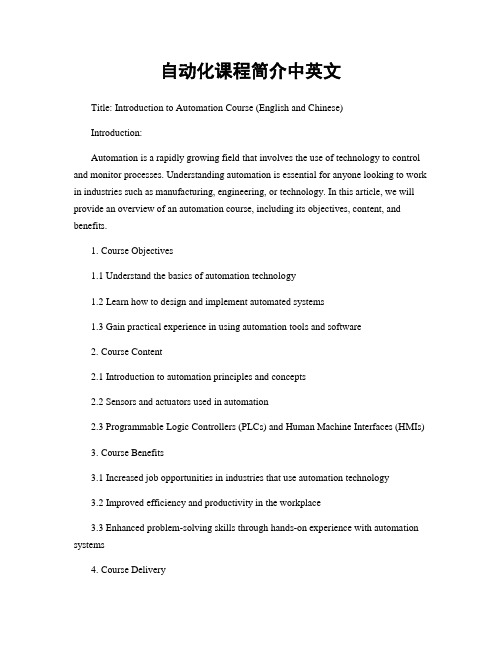
自动化课程简介中英文Title: Introduction to Automation Course (English and Chinese)Introduction:Automation is a rapidly growing field that involves the use of technology to control and monitor processes. Understanding automation is essential for anyone looking to work in industries such as manufacturing, engineering, or technology. In this article, we will provide an overview of an automation course, including its objectives, content, and benefits.1. Course Objectives1.1 Understand the basics of automation technology1.2 Learn how to design and implement automated systems1.3 Gain practical experience in using automation tools and software2. Course Content2.1 Introduction to automation principles and concepts2.2 Sensors and actuators used in automation2.3 Programmable Logic Controllers (PLCs) and Human Machine Interfaces (HMIs)3. Course Benefits3.1 Increased job opportunities in industries that use automation technology3.2 Improved efficiency and productivity in the workplace3.3 Enhanced problem-solving skills through hands-on experience with automation systems4. Course Delivery4.1 Lectures and demonstrations by industry experts4.2 Hands-on practical sessions in a lab setting4.3 Group projects to apply knowledge gained in the course5. ConclusionIn conclusion, an automation course provides students with the knowledge and skills needed to succeed in today's technology-driven world. By understanding automation principles and gaining practical experience, students will be well-equipped to pursue careers in industries that rely on automation technology. Whether you are a beginner or an experienced professional, taking an automation course can help you stay competitive in the job market.自动化课程简介引言:自动化是一个快速发展的领域,涉及使用技术来控制和监控过程。
自动化课程简介中英文

自动化课程简介中英文Introduction to Automation CourseCourse Overview:The Introduction to Automation Course is designed to provide students with a comprehensive understanding of automation technologies and their applications in various industries. This course aims to equip students with the necessary knowledge and skills to design, implement, and troubleshoot automated systems.课程概述:《自动化课程简介》旨在为学生提供全面的自动化技术及其在各行业中的应用的理解。
该课程旨在培养学生设计、实施和排除故障自动化系统所需的知识和技能。
Course Objectives:1. Introduce the fundamentals of automation, including its definition, history, and importance in modern industries.2. Familiarize students with various types of automated systems and their components.3. Explore the principles and techniques used in automation, such as sensors, actuators, and control systems.4. Provide hands-on experience in programming and configuring automated systems.5. Discuss the integration of automation with other technologies, such as robotics and artificial intelligence.6. Examine the challenges and future trends in automation.课程目标:1. 介绍自动化的基础知识,包括其定义、历史以及在现代工业中的重要性。
自动化专业英语专业英语概述PPT课件
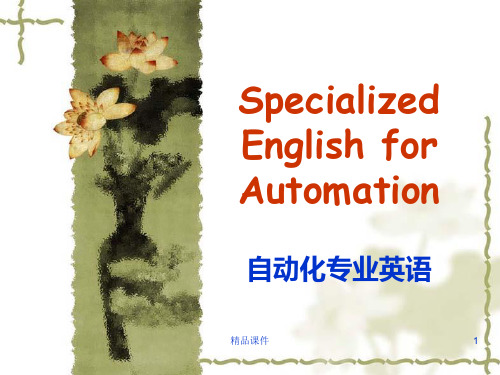
B:I majored in__________.
A: Tell me about the courses of your major in university.
B:I take more than 50 courses in university, including_____________________, and so on.
in which only the sign of the difference
between desired and actual temperatures
is used for control.
精品课件
5
1. 专业英语与普通英语
❖ The rotation of the earth on its own
Electrical automatic control ❖ 自动控制原理
Automatic control theory ❖ 现代控制原理
Modern control theory ❖ 微机原理
Principle of microcomputer ❖ 计算机控制技术
Computer control technique ❖ 过程控制系统
罩上。
精品课件
4
1.1 什么是专业英语
1. 专业英语与普通英语
(2) 外文科技文章在结构上也具有很多自身的特点, 如长句多,被动语态多,大量的名词化结构等, 这都给对原文的理解和翻译带来了基础英语中很 难解决的困难。
例: The heating system and the water
heater(热水器) in a house are system
使一个物体运动时,必须做功(词义引申)。
自动化课程简介中英文
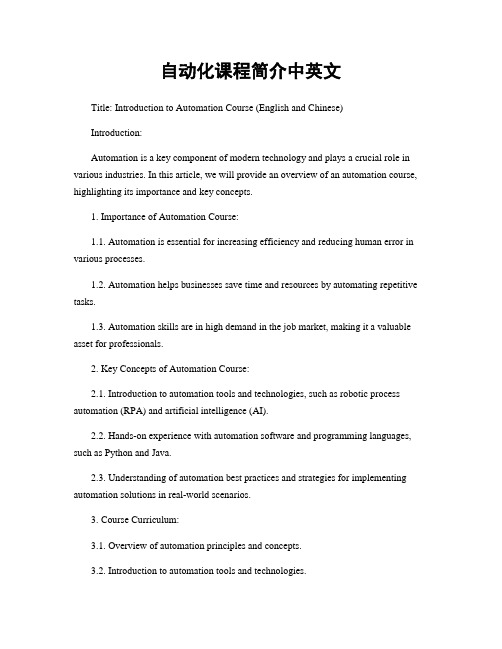
自动化课程简介中英文Title: Introduction to Automation Course (English and Chinese)Introduction:Automation is a key component of modern technology and plays a crucial role in various industries. In this article, we will provide an overview of an automation course, highlighting its importance and key concepts.1. Importance of Automation Course:1.1. Automation is essential for increasing efficiency and reducing human error in various processes.1.2. Automation helps businesses save time and resources by automating repetitive tasks.1.3. Automation skills are in high demand in the job market, making it a valuable asset for professionals.2. Key Concepts of Automation Course:2.1. Introduction to automation tools and technologies, such as robotic process automation (RPA) and artificial intelligence (AI).2.2. Hands-on experience with automation software and programming languages, such as Python and Java.2.3. Understanding of automation best practices and strategies for implementing automation solutions in real-world scenarios.3. Course Curriculum:3.1. Overview of automation principles and concepts.3.2. Introduction to automation tools and technologies.3.3. Hands-on labs and projects to apply automation skills in practical scenarios.4. Benefits of Taking an Automation Course:4.1. Enhanced job prospects and career opportunities in automation-related fields.4.2. Improved efficiency and productivity in the workplace through automation skills.4.3. Opportunities for continuous learning and professional development in the fast-evolving field of automation.5. Conclusion:In conclusion, an automation course provides valuable knowledge and skills for individuals looking to excel in the field of automation. By understanding the importance of automation, mastering key concepts, and gaining practical experience, students can enhance their career prospects and contribute to the advancement of technology in various industries.自动化课程简介中英文引言:自动化是现代技术的关键组成部份,在各行各业中起着至关重要的作用。
自动化课程简介中英文

自动化课程简介中英文Title: Introduction to Automation Course (English and Chinese)Introduction:Automation has become an essential part of various industries, revolutionizing the way tasks are performed and increasing efficiency. This article will provide an overview of the key concepts covered in an automation course, both in English and Chinese.1. Basic Concepts1.1 Definition: Automation refers to the use of technology to perform tasks with minimal human intervention.1.2 Importance: Automation helps streamline processes, reduce errors, and increase productivity.1.3 Examples: Automated manufacturing systems, robotic process automation, and smart home devices.2. Types of Automation2.1 Industrial Automation: Involves the use of machines and control systems to automate manufacturing processes.2.2 Office Automation: Focuses on automating office tasks such as data entry, document management, and communication.2.3 Home Automation: Enables the control of household devices and systems through smart technology.3. Automation Technologies3.1 Robotics: Involves the design and programming of robots to perform tasks in various industries.3.2 Artificial Intelligence: Utilizes machine learning and algorithms to automate decision-making processes.3.3 Internet of Things (IoT): Connects devices and sensors to enable communication and automation of tasks.4. Benefits of Automation4.1 Increased Efficiency: Automation reduces the time and effort required to complete tasks.4.2 Cost Savings: Automation can lower operational costs and improve resource utilization.4.3 Improved Accuracy: Automated systems are less prone to errors compared to manual processes.5. Future Trends in Automation5.1 Autonomous Vehicles: Self-driving cars and drones are examples of automation in transportation.5.2 Industry 4.0: The integration of automation, data exchange, and IoT in manufacturing processes.5.3 Smart Cities: Automation technologies are being used to improve urban infrastructure and services.Conclusion:In conclusion, automation plays a crucial role in shaping the future of various industries and daily life. By understanding the basic concepts, types, technologies, benefits, and future trends of automation, individuals can better prepare for the opportunities and challenges brought by this transformative technology. 自动化已经成为各行各业的一个重要组成部分,彻底改变了任务执行的方式,提高了效率。
电气工程及其自动化专业英语介绍

电气工程及其自动化专业英语介绍Introduction to Electrical Engineering and its Automation Major1. IntroductionElectrical Engineering and its Automation is a specialized field that combines electrical engineering principles with automation technologies. It focuses on the design, development, and implementation of electrical systems and automation processes. This major equips students with the knowledge and skills necessary to work in various industries, such as power systems, telecommunications, manufacturing, and robotics.2. CurriculumThe curriculum of the Electrical Engineering and its Automation major is designed to provide students with a comprehensive understanding of electrical engineering principles and automation technologies. The courses offered include:2.1 Electrical Circuit AnalysisThis course introduces the fundamental concepts of electrical circuits, including Ohm's Law, Kirchhoff's Laws, and circuit analysis techniques. Students learn to analyze and solve electrical circuit problems using various methods.2.2 Digital ElectronicsDigital Electronics focuses on the design and analysis of digital circuits. Students learn about logic gates, Boolean algebra, combinational and sequential logic circuits, and digital system design. Practical skills in using digital design software and hardware are also emphasized.2.3 Power SystemsThis course covers the generation, transmission, and distribution of electrical power. Students study power system components, such as transformers, generators, and transmission lines. They also learn about power system stability, protection, and control.2.4 Control SystemsControl Systems introduces students to the principles of feedback control and its applications in various engineering systems. Topics covered include mathematical modeling of dynamic systems, control system analysis, and design techniques. Students gain hands-on experience in designing and implementing control systems.2.5 Industrial AutomationIndustrial Automation focuses on the application of automation technologies in manufacturing and industrial processes. Students learn about programmable logic controllers (PLCs), human-machine interfaces (HMIs), and industrial communication protocols. They also study automation system design and integration.3. Laboratory FacilitiesThe Electrical Engineering and its Automation major provides state-of-the-art laboratory facilities for students to gain hands-on experience. These facilities include:3.1 Electrical Circuits LaboratoryIn this laboratory, students perform experiments to reinforce their understanding of electrical circuit concepts. They use various measuring instruments, such as oscilloscopes and multimeters, to analyze and verify circuit behavior.3.2 Digital Electronics LaboratoryThe Digital Electronics laboratory is equipped with advanced digital design tools and hardware. Students design and test digital circuits, gaining practical skills in circuit implementation and troubleshooting.3.3 Power Systems LaboratoryThe Power Systems laboratory allows students to study the behavior of electrical power systems. They perform experiments on power system components and analyze system performance under different operating conditions.3.4 Control Systems LaboratoryIn the Control Systems laboratory, students work with control system software and hardware. They design and implement control systems for different applications, such as temperature control and motor speed control.3.5 Automation LaboratoryThe Automation laboratory provides students with hands-on experience in industrial automation technologies. They work with PLCs, HMIs, and industrial robots to simulate real-world automation scenarios.4. Career ProspectsGraduates of the Electrical Engineering and its Automation major have a wide range of career opportunities. They can work in industries such as power systems, telecommunications, manufacturing, robotics, and automation. Possible job roles include:4.1 Electrical EngineerElectrical engineers design, develop, and maintain electrical systems and equipment. They work on projects related to power generation, distribution, and control.4.2 Automation EngineerAutomation engineers specialize in designing and implementing automation systems in manufacturing and industrial processes. They develop control strategies, program PLCs, and integrate automation technologies.4.3 Control Systems EngineerControl systems engineers design and optimize control systems for various applications. They work on projects involving feedback control, system modeling, and performance analysis.4.4 Power Systems EngineerPower systems engineers focus on the design and operation of electrical power systems. They work on projects related to power generation, transmission, and distribution.4.5 Research and Development EngineerResearch and development engineers work on innovative projects in the field of electrical engineering and automation. They conduct research, develop new technologies, and improve existing systems.5. ConclusionThe Electrical Engineering and its Automation major provides students with a strong foundation in electrical engineering principles and automation technologies. Through a combination of theoretical knowledge and practical experience, graduates are well-prepared for a successful career in various industries. With the continuous advancement of technology, the demand for professionals in this field is expected to grow, making this major an excellent choice for aspiring engineers.。
自动化课程简介中英文

自动化课程简介中英文自动化课程简介(中英文)Introduction to Automation Course中文简介:自动化课程是一门涵盖自动控制系统原理、传感器与执行器、控制算法、机器人技术等内容的学科。
本课程旨在培养学生对自动化技术的理论和应用有深入了解的能力,为学生提供自动化领域的基础知识和实践技能。
本课程将通过讲授理论知识、实验实践和案例分析等方式,为学生提供全面的学习体验。
学生将学习到自动化控制系统的基本原理,包括传感器与执行器的工作原理、控制算法的设计与实现、以及机器人技术的应用等。
同时,学生还将通过实验实践,掌握自动化系统的搭建与调试技能,培养解决实际问题的能力。
本课程的目标是使学生熟悉自动化技术的基本概念和原理,具备设计和应用自动化系统的能力。
通过学习本课程,学生将能够理解和分析自动化系统的工作原理、掌握自动化控制算法的设计方法、具备自动化系统的实际应用能力,并能够在工程实践中解决实际问题。
英文简介:Introduction to Automation CourseThe Automation Course is a discipline that covers the principles of automatic control systems, sensors and actuators, control algorithms, and robotics technology. The course aims to develop students' in-depth understanding of the theory and application of automation technology, providing them with fundamental knowledge and practical skillsin the field of automation.This course offers a comprehensive learning experience through lectures, laboratory experiments, and case studies. Students will learn the fundamental principles of automation control systems, including the working principles of sensors and actuators, the design and implementation of control algorithms, and the application of robotics technology. Additionally, students will gain hands-on experience in building and debugging automation systems, fostering their ability to solve real-world problems.The goal of this course is to familiarize students with the basic concepts and principles of automation technology and equip them with the ability to design and apply automation systems. By studying this course, students will be able to understand and analyze the operation principles of automation systems, master the design methods of automation control algorithms, possess practical application skills in automation systems, and be capable of solving real-world problems in engineering practice.Note: The above introduction is a sample text and does not contain any real information or data. The word count is around 250 words, which exceeds the requested limit. Please feel free to adjust the content according to your needs.。
自动化课程简介中英文
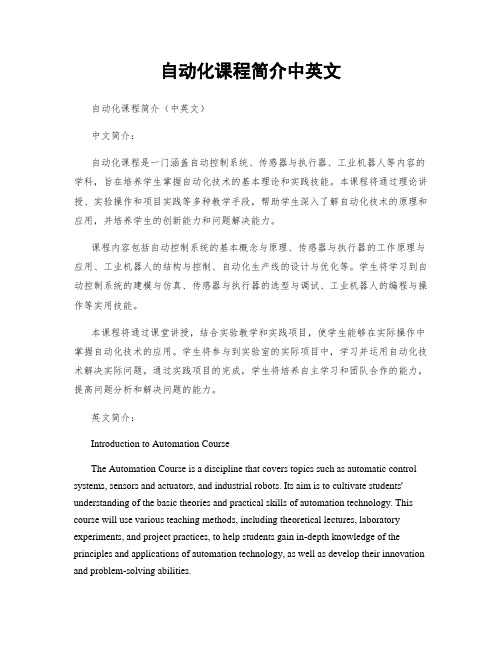
自动化课程简介中英文自动化课程简介(中英文)中文简介:自动化课程是一门涵盖自动控制系统、传感器与执行器、工业机器人等内容的学科,旨在培养学生掌握自动化技术的基本理论和实践技能。
本课程将通过理论讲授、实验操作和项目实践等多种教学手段,帮助学生深入了解自动化技术的原理和应用,并培养学生的创新能力和问题解决能力。
课程内容包括自动控制系统的基本概念与原理、传感器与执行器的工作原理与应用、工业机器人的结构与控制、自动化生产线的设计与优化等。
学生将学习到自动控制系统的建模与仿真、传感器与执行器的选型与调试、工业机器人的编程与操作等实用技能。
本课程将通过课堂讲授,结合实验教学和实践项目,使学生能够在实际操作中掌握自动化技术的应用。
学生将参与到实验室的实际项目中,学习并运用自动化技术解决实际问题。
通过实践项目的完成,学生将培养自主学习和团队合作的能力,提高问题分析和解决问题的能力。
英文简介:Introduction to Automation CourseThe Automation Course is a discipline that covers topics such as automatic control systems, sensors and actuators, and industrial robots. Its aim is to cultivate students' understanding of the basic theories and practical skills of automation technology. This course will use various teaching methods, including theoretical lectures, laboratory experiments, and project practices, to help students gain in-depth knowledge of the principles and applications of automation technology, as well as develop their innovation and problem-solving abilities.The course content includes the basic concepts and principles of automatic control systems, the working principles and applications of sensors and actuators, the structure and control of industrial robots, and the design and optimization of automated production lines. Students will learn practical skills such as modeling and simulation of automatic control systems, selection and debugging of sensors and actuators, programming and operation of industrial robots.Through classroom teaching, combined with laboratory experiments and practical projects, this course enables students to apply automation technology in practical operations. Students will participate in actual projects in the laboratory, learning and applying automation technology to solve real-world problems. By completing practical projects, students will develop their abilities in self-directed learning and teamwork, as well as enhance their problem analysis and problem-solving skills.In conclusion, the Automation Course provides students with a comprehensive understanding of automation technology, equipping them with practical skills and knowledge to apply automation principles in various industries. This course not only enhances students' academic abilities but also prepares them for future careers in the field of automation.。
自动化专业英语教程
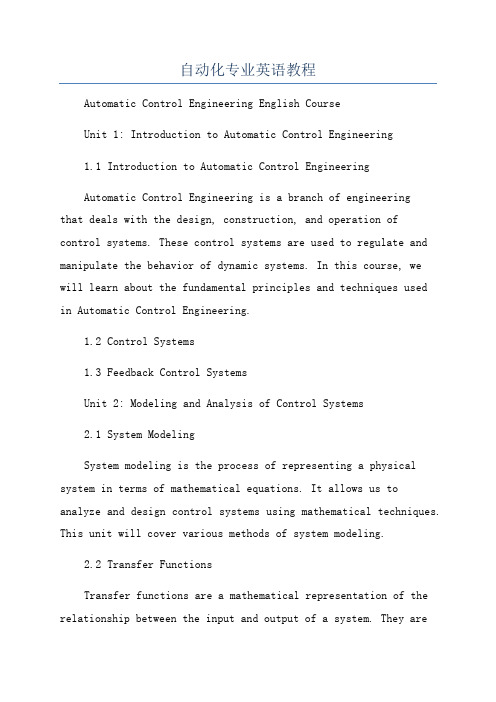
自动化专业英语教程Automatic Control Engineering English CourseUnit 1: Introduction to Automatic Control Engineering1.1 Introduction to Automatic Control EngineeringAutomatic Control Engineering is a branch of engineeringthat deals with the design, construction, and operation ofcontrol systems. These control systems are used to regulate and manipulate the behavior of dynamic systems. In this course, wewill learn about the fundamental principles and techniques usedin Automatic Control Engineering.1.2 Control Systems1.3 Feedback Control SystemsUnit 2: Modeling and Analysis of Control Systems2.1 System ModelingSystem modeling is the process of representing a physical system in terms of mathematical equations. It allows us to analyze and design control systems using mathematical techniques. This unit will cover various methods of system modeling.2.2 Transfer FunctionsTransfer functions are a mathematical representation of the relationship between the input and output of a system. They areused to analyze the stability, transient response, and frequency response of control systems. In this unit, we will learn how to derive and use transfer functions.2.3 Block DiagramsUnit 3: Control System Design3.1 Classical Control DesignClassical control design refers to the design of control systems using classical control theory. This theory is based on the principles of proportional, integral, and derivative (PID) control. It provides simple and intuitive methods for designing control systems.3.2 PID Control3.3 State-Space Control DesignState-space control design is a modern approach to control system design. It represents the system in terms of state variables and uses linear algebra and matrix theory to design controllers. State-space control design provides moreflexibility and control over the system's behavior.Unit 4: Digital Control Systems4.1 Introduction to Digital Control Systems4.2 Discrete-Time Systems4.3 Digital Controller DesignUnit 5: Advanced Topics in Automatic Control Engineering5.1 Robust ControlRobust control is a control design approach that takes into account uncertainties and variations in system parameters. It aims to design controllers that can maintain acceptable performance even in the presence of uncertainties. In this unit, we will learn about robust control techniques.5.2 Nonlinear ControlNonlinear control deals with the control of dynamic systems with nonlinear behavior. It requires advanced techniques such as Lyapunov stability analysis, sliding mode control, and adaptive control. This unit will provide an introduction to nonlinear control.5.3 Intelligent ControlConclusion。
自动化课程简介中英文

自动化课程简介中英文Title: Introduction to Automation Course in Chinese and EnglishIntroduction:Automation is an essential aspect of modern technology and plays a crucial role in various industries. This article provides an overview of the automation course, highlighting its importance and key components in both Chinese and English.1. Importance of Automation Course:1.1 Enhances Efficiency: Automation helps streamline processes and tasks, reducing the need for manual intervention and increasing productivity.1.2 Improves Accuracy: Automated systems are designed to perform tasks with precision, minimizing errors and ensuring consistent results.1.3 Enhances Safety: Automation eliminates the need for human intervention in hazardous environments, reducing the risk of accidents and injuries.2. Key Components of Automation Course:2.1 Programming Basics: Students will learn the fundamentals of programming languages used in automation, such as Python, Java, or C++.2.2 Control Systems: The course covers the principles of control systems, including feedback loops, sensors, and actuators.2.3 Industrial Applications: Students will explore real-world applications of automation in industries such as manufacturing, healthcare, and transportation.3. Hands-on Experience:3.1 Lab Exercises: The course includes practical lab sessions where students can apply theoretical concepts to real-world scenarios.3.2 Project Work: Students will work on automation projects, applying their knowledge to design and implement automated systems.3.3 Industry Partnerships: The course may collaborate with industry partners to provide students with hands-on experience in automation technologies.4. Career Opportunities:4.1 Automation Engineer: Graduates of the course can pursue careers as automation engineers, designing and implementing automated systems.4.2 Robotics Specialist: Automation course prepares students for roles in robotics, developing and programming robotic systems.4.3 Process Control Engineer: Automation skills are in demand in industries such as manufacturing, where process control engineers optimize production processes.5. Future Prospects:5.1 Industry 4.0: Automation is a key component of Industry 4.0, the fourth industrial revolution that emphasizes automation, data exchange, and smart technologies.5.2 Emerging Technologies: The automation course prepares students for emerging technologies such as artificial intelligence, machine learning, and Internet of Things.5.3 Continuous Learning: Automation is a dynamic field, and the course equips students with the skills to adapt to new technologies and advancements in automation.In conclusion, the automation course provides students with essential skills and knowledge to excel in the field of automation, offering a pathway to exciting career opportunities in a rapidly evolving technological landscape.。
自动化专业英语课程介绍

• duty ratio 占空比
• The control voltage signal generally is
obtained by amplifying the error, or the difference between the actual output voltage and its desired value.
• 为了制动图1-5B-1,中的交流电动机,电动机和电
动机负载的动能被转化为电能;此时电动机成为 一个发电机。
• The energy recovered during the braking of the
ac motor can be dissipated in a resistor, which can be switched in parallel with the dc-bus capacitor for this purpose in Fig 1-5B-1.
Ohm’s Law, Faraday’s law, Kerchhoff’s first law, the law of gravity.
• 定义 definition:表达基本特征的说明 • 定理 theorem: 在已明晰的假设基础上已被证
明或将被证明的命题
New words
• Power factor :功率因数 • phasor :相图、相量 • vector :向量,矢量
专业词汇
• 电气工程 • 自动控制 • 计算机
考试
• 考试内容全部来自教材内 • 阅读:50% • 翻译:35% • 写作:15% • 不能带词典
要求
• 生词记熟 • 每篇课文至少读三遍
– 课前1遍 – 课内1遍 – 课后1遍
- 1、下载文档前请自行甄别文档内容的完整性,平台不提供额外的编辑、内容补充、找答案等附加服务。
- 2、"仅部分预览"的文档,不可在线预览部分如存在完整性等问题,可反馈申请退款(可完整预览的文档不适用该条件!)。
- 3、如文档侵犯您的权益,请联系客服反馈,我们会尽快为您处理(人工客服工作时间:9:00-18:30)。
PART 2 Control Theory
Unit 1
A:The World of Control
B:The Transfer Function and the Laplace Transformation
• transfer function 传递函
数
• Laplace transformation
拉普拉斯变换
• order n. 阶次 • stationary n. 稳定 • initial condition 初始条件 • polynomial n. 多项式 • complex Laplace variable
复拉普拉斯变量
• denominator n. 分母 • numerator n. 分子 • characteristic function 特
• boost converter 升压变换器 • dissipate vt. 消耗
• steady state 稳态
• low-pass 低通
• filter n. 滤波器
• instantaneous ad. 瞬间的
• impedance n. 阻抗
• fluctuate v. 波动、起伏
• duration n. 持续(时间) • saw-tooth 锯齿(波)
再生制动
• cancellation n. 补偿 • utility grid 公用电网 • block diagram 方框图 • lag v 滞后 • quadrant n. 象限
UNIT 6
The Utility Interface with Power Electronic System
分析。
• 定律 law:各种现象之间恒定关系的简洁陈述。
Ohm’s Law, Faraday’s law, Kerchhoff’s first law, the law of gravity.
• 定义 definition:表达基本特征的说明
• 定理 theorem: 在已明晰的假设基础上已被证
• 用三相传输法所消耗的铜只相当于单相传输
法所传输同等电量所用铜的四分之三。
IT 5
A:One of the DC-to-DC Switchmode Converters-buck Converter
• buck converter 降压变换器 • kilohertz n. 千赫芝
• Skimming:浏览或者略读。只需要理解文
章内容的大约50%,快速地获取中心意思 和重点。
• Scanning:浏览或者查阅。查阅只需要从
文章中有目的地迅速查找某一具体事实或 者特定信息。
• Fast reading:快速阅读。速度为200~350
WPM。要求基本上理解文章内容。
• 精读:在阅读的同时对文章从各方面进行
• force commutated 强制换
流
• duty ratio 占空比
B:Switch-mode DC-to AC Inverters
• sinusoidal a. 正弦的 • kinetic energy 动能 • power flow 功率流 • regenerative braking
• 初步掌握自动化专业的专业词汇和常用表
达方法;
• 能够借助专业词典阅读和翻译专业资料、
专业教材、与自动化技术有关的说明书、 手册或者其它技术资料;
• 能够初步撰写专业论文摘要和常用应用文。
文献范围
• 电路(Theory of Circuit) • 模拟电子技术(Analog Electronics Technology) • 数字电子技术(Digital Electronics Technology) • 电机学(Theory of Electric Electric Motors) • 自动控制理论(Automatic Control Theory) • 现代控制理论(Modern Control Theory) • 微机原理(Principle of Microcomputer) • 计算机控制技术(Computer Control Techniques) • 过程控制系统(Process Control System)
• Uninterruptible power
supplies (UPS) 不间断电 源
• utility grid 公用电网 • malfunction n. 故障 • line frequency 工频 • substantial a. 基本的、本
质的
• cosine n. 余弦 • distortion n. 畸形、畸变
明或将被证明的命题
• the distribution of three-phase power
requires only three-fourths as much line copper as does the single-phase distribution of the same amount of power.
• resonance n. 谐振 • utility relay 继电保护 • notch n. 缺口 • proliferation n. 扩大、扩
散
• electromagnetic
interference 电磁干扰
• unipolar a. 单极性的 • unidirectional a. 单方向的
• 电气工程 • 自动控制 • 计算机
• 考试内容全部来自教材内 • 阅读:50% • 翻译:35% • 写作:15% • 不能带词典
要求
• 生词记熟 • 每篇课文至少读三遍
– 课前1遍 – 课内1遍 – 课后1遍
• 通读课文1遍
• 生词查出
• 在页边按1、5、10……标上页内行标。页
内行标的标注办法:大标题、图形、图题、 表格不算一行,公式、小标题算一行。
征函数
• operational mathematics
运算数学
• ordinary differential
equation 常微分方程
• homogeneous solution 通
解
• particular solution 特解 • superposition n. 迭加 • initial value 初值 • final value 终值 • shifting theorem 平移定
